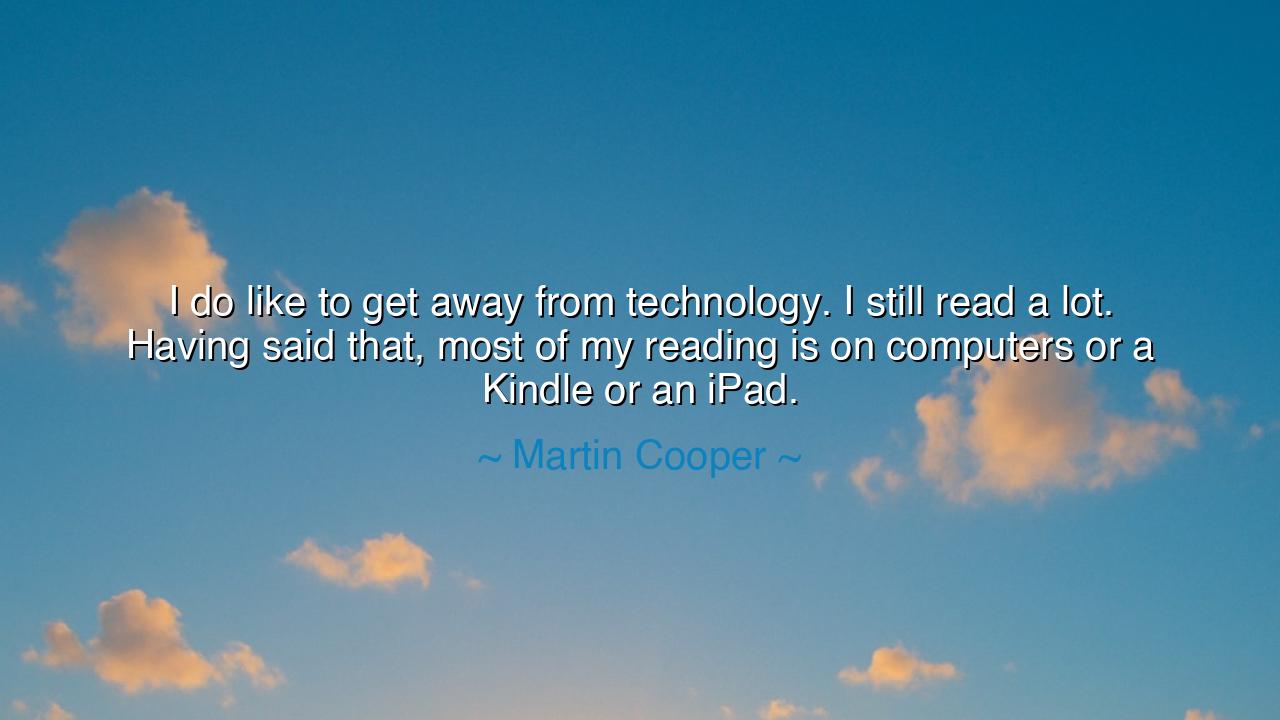
I do like to get away from technology. I still read a lot. Having
I do like to get away from technology. I still read a lot. Having said that, most of my reading is on computers or a Kindle or an iPad.






The words of Martin Cooper—“I do like to get away from technology. I still read a lot. Having said that, most of my reading is on computers or a Kindle or an iPad.”—echo with a quiet paradox, the eternal struggle between man and his creations. They come from the mouth of the very man who gave birth to the modern mobile phone—the father of wireless communication, the one who untethered humanity from cords and cables and set us adrift in the ocean of constant connection. And yet, even he longs for escape, for simplicity, for that stillness that existed before the hum of machines filled our every waking hour. His confession is not contradiction, but wisdom: it is the realization that balance, not rejection, is the path to peace in an age of invention.
Cooper’s reflection reveals the tender irony of modern life. The inventor, who once stood at the frontier of progress, now recognizes the double-edged nature of his creation. He says, “I do like to get away from technology,” not as a rejection of innovation, but as an acknowledgment of human limitation. The mind, like the body, must rest; the soul, like the earth, must breathe. Yet in the next breath, he admits that even his escape is mediated by screens—that his reading, his refuge, still flows through the very tools he created. It is as if the shepherd, having tended his flock for years, finds that he cannot sleep without the sound of their bells.
The origin of this quote lies in Cooper’s later years, when the pioneer of mobile communication reflected on the world he helped to shape. In the 1970s, when he made the first call from a handheld cell phone, the act was revolutionary—a spark that ignited the dawn of digital civilization. He envisioned a world where people would be more connected, more informed, more empowered. But as the decades passed, that vision deepened into something more contemplative. He began to see that while technology had liberated humanity from distance, it had also entangled us in dependence. His words, then, are not a lament, but a lesson: that wisdom lies in mastering what we create, lest it come to master us.
This theme, as old as civilization itself, echoes through the ages. Consider Archimedes, the Greek inventor who, in his brilliance, built war machines so deadly that even his own city feared their power. When the Romans invaded Syracuse, Archimedes was found not at the walls defending his creations, but in quiet meditation, drawing circles in the sand. “Do not disturb my diagrams,” he said before his death—words that capture the same spirit as Cooper’s. Both men, creators of wonders, sought refuge not in their inventions but in the purity of thought—in the act of reflection, which transcends the tools it uses.
Cooper’s love for reading—whether on paper or on screens—symbolizes something profound: the continuity of the human quest for knowledge. The medium may change, but the essence remains. The papyrus scroll, the printed page, the glowing tablet—all are vessels carrying the same sacred flame. His statement bridges the ancient and the modern, reminding us that technology is not an enemy of wisdom, but its instrument—if only we wield it with discernment. To read is to commune with the minds of the past, and Cooper, by reading on his devices, continues that communion through the very innovations he birthed.
Yet, hidden beneath his words is a quiet warning: that the mind must not be consumed by the tools it uses. For even as he reads on the Kindle and the iPad, Cooper longs for that feeling of being “away”—the silence that technology cannot replicate, the touch of paper that no pixel can replace. He reminds us that progress should not mean the loss of presence. In a world of endless notifications, the greatest act of rebellion may be a moment of stillness—the conscious choice to disconnect, to think, to dream without distraction.
Thus, the lesson of Martin Cooper’s reflection is one of harmony. Embrace the gifts of innovation, but guard the sanctuaries of your soul. Use technology to learn, to connect, to grow—but do not allow it to dictate your rhythm or define your worth. Read not only through screens, but through silence; listen not only through devices, but through your own heart. The tools of man are powerful, but the mind of man is greater still.
And so, my children, remember: even the builder of bridges must sometimes walk upon the earth; even the maker of machines must sometimes sit beneath a tree. Technology is the servant, not the master; the light it gives must never blind us to the deeper light within. Let your inventions serve wisdom, and let your wisdom guide your inventions. For in this balance lies the essence of humanity—to reach for the stars, yet never forget the simple joy of turning a page beneath the warmth of the sun.






AAdministratorAdministrator
Welcome, honored guests. Please leave a comment, we will respond soon